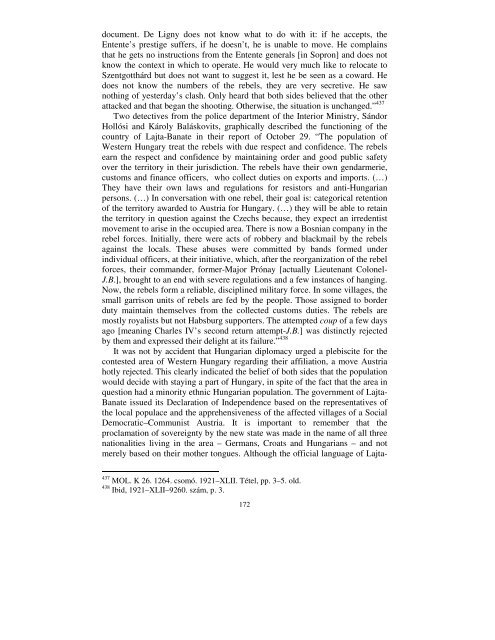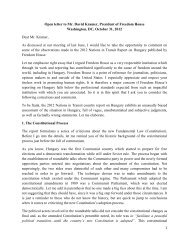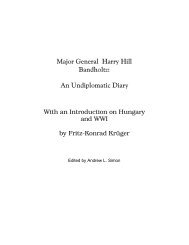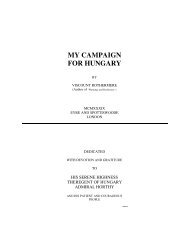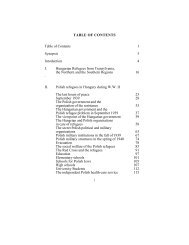The Fate of Western Hungary 1918-1921 - Corvinus Library ...
The Fate of Western Hungary 1918-1921 - Corvinus Library ...
The Fate of Western Hungary 1918-1921 - Corvinus Library ...
You also want an ePaper? Increase the reach of your titles
YUMPU automatically turns print PDFs into web optimized ePapers that Google loves.
document. De Ligny does not know what to do with it: if he accepts, the<br />
Entente’s prestige suffers, if he doesn’t, he is unable to move. He complains<br />
that he gets no instructions from the Entente generals [in Sopron] and does not<br />
know the context in which to operate. He would very much like to relocate to<br />
Szentgotthárd but does not want to suggest it, lest he be seen as a coward. He<br />
does not know the numbers <strong>of</strong> the rebels, they are very secretive. He saw<br />
nothing <strong>of</strong> yesterday’s clash. Only heard that both sides believed that the other<br />
attacked and that began the shooting. Otherwise, the situation is unchanged.” 437<br />
Two detectives from the police department <strong>of</strong> the Interior Ministry, Sándor<br />
Hollósi and Károly Baláskovits, graphically described the functioning <strong>of</strong> the<br />
country <strong>of</strong> Lajta-Banate in their report <strong>of</strong> October 29. “<strong>The</strong> population <strong>of</strong><br />
<strong>Western</strong> <strong>Hungary</strong> treat the rebels with due respect and confidence. <strong>The</strong> rebels<br />
earn the respect and confidence by maintaining order and good public safety<br />
over the territory in their jurisdiction. <strong>The</strong> rebels have their own gendarmerie,<br />
customs and finance <strong>of</strong>ficers, who collect duties on exports and imports. (…)<br />
<strong>The</strong>y have their own laws and regulations for resistors and anti-Hungarian<br />
persons. (…) In conversation with one rebel, their goal is: categorical retention<br />
<strong>of</strong> the territory awarded to Austria for <strong>Hungary</strong>. (…) they will be able to retain<br />
the territory in question against the Czechs because, they expect an irredentist<br />
movement to arise in the occupied area. <strong>The</strong>re is now a Bosnian company in the<br />
rebel forces. Initially, there were acts <strong>of</strong> robbery and blackmail by the rebels<br />
against the locals. <strong>The</strong>se abuses were committed by bands formed under<br />
individual <strong>of</strong>ficers, at their initiative, which, after the reorganization <strong>of</strong> the rebel<br />
forces, their commander, former-Major Prónay [actually Lieutenant Colonel-<br />
J.B.], brought to an end with severe regulations and a few instances <strong>of</strong> hanging.<br />
Now, the rebels form a reliable, disciplined military force. In some villages, the<br />
small garrison units <strong>of</strong> rebels are fed by the people. Those assigned to border<br />
duty maintain themselves from the collected customs duties. <strong>The</strong> rebels are<br />
mostly royalists but not Habsburg supporters. <strong>The</strong> attempted coup <strong>of</strong> a few days<br />
ago [meaning Charles IV’s second return attempt-J.B.] was distinctly rejected<br />
by them and expressed their delight at its failure.” 438<br />
It was not by accident that Hungarian diplomacy urged a plebiscite for the<br />
contested area <strong>of</strong> <strong>Western</strong> <strong>Hungary</strong> regarding their affiliation, a move Austria<br />
hotly rejected. This clearly indicated the belief <strong>of</strong> both sides that the population<br />
would decide with staying a part <strong>of</strong> <strong>Hungary</strong>, in spite <strong>of</strong> the fact that the area in<br />
question had a minority ethnic Hungarian population. <strong>The</strong> government <strong>of</strong> Lajta-<br />
Banate issued its Declaration <strong>of</strong> Independence based on the representatives <strong>of</strong><br />
the local populace and the apprehensiveness <strong>of</strong> the affected villages <strong>of</strong> a Social<br />
Democratic–Communist Austria. It is important to remember that the<br />
proclamation <strong>of</strong> sovereignty by the new state was made in the name <strong>of</strong> all three<br />
nationalities living in the area – Germans, Croats and Hungarians – and not<br />
merely based on their mother tongues. Although the <strong>of</strong>ficial language <strong>of</strong> Lajta-<br />
437 MOL. K 26. 1264. csomó. <strong>1921</strong>–XLII. Tétel, pp. 3–5. old.<br />
438 Ibid, <strong>1921</strong>–XLII–9260. szám, p. 3.<br />
172


